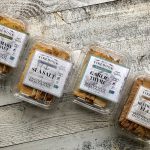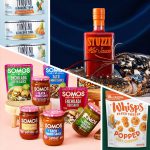Sir Kensington’s Launches Vegan Mayo “Fabanaise” at Expo West
It’s hard to imagine ever calling condiments a “hot category,” but alternatives to big brands like Heinz and Hunt’s have been gaining speed lately, either through the premiumization of process and ingredients, updated brand propositions, or even scientific advances that eliminate products like animal fats.
Attention has come to the category through investors, who have backed companies like Silicon Valley favorite Hampton Creek, Food-X affiliated startup True Made Foods, and also Sir Kensington’s, which pulled in an $8.5 million investment round headed by consumer goods-focused family office Verlinvest late last year.
While it’s focused largely on creating higher-end alternatives to mainstream brands thus far, Sir Kensington’s moved slightly closer to Hampton Creek territory today, announcing that it was launching a vegan alt-mayo of its very own, Fabanaise – it’s a vegan mayo made from aquafaba, that starchy water left behind when you boil chickpeas (or other legumes). Available in plain and chipotle, it’s priced at $5.99 for a 16 oz. jar.
Project NOSH connected with Mark Ramadan, the co-founder and CEO of Sir Kensington’s, for some quick insights into the rationale behind the launch.
Project NOSH: What’s going on in the marketplace that makes this kind of innovation someplace where the company wanted to go? Do you think that for condiment companies having an eggless or vegan mayonnaise is going to be a requirement down the road?
Mark Ramadan: Our mission at Sir Kensington’s is to bring integrity and charm to ordinary and overlooked food. To us, there’s nothing more overlooked and ordinary than condiments, and vegan mayo is no exception. We’re lucky to have big and loyal fan base, but many of them chose to avoid eggs, meaning they can enjoy our ketchup and mustard but not our award-winning mayonnaise. We thought there was an opportunity both to improve the vegan mayo category and give something to those who can’t enjoy our egg-based mayo.
All vegan mayo that’s out there now made with powdered soy, pea or modified food starches, ingredients that are a far cry from nature, and we thought the taste and texture could be better too. We set out to find a simpler and more delicious solution, as we do with every product or category we make — with a focus on taste, we are always looking to re-invent the perception of the category. As more people choose to avoid animal products, and more shoppers stay only on the perimeter of the store, vegan mayo will absolutely be around for the long haul, and it is growing faster than egg-based mayo, but I don’t think regular mayonnaise will go away. There is room for both. I do think the bar will continue to be raised for egg-based mayo, especially when it comes to the quality of eggs. We use Certified Humane Free Range eggs, and it’ll no longer be enough to only use cage free in the near future.
PN: Who came up with the idea for this one? It’s such a cool concept but so under-the-radar when compared with the heavy promotion of Hampton Creek — so what are the advantages? And what’s the shelf life?
MR: It was all done in-house by our R&D team! When approaching a new category, first we ask is there room for improvement. Looking around in the vegan mayo category, the powdered soy and pea proteins and starches that are used as egg substitutes look more like a chemistry lab than a kitchen pantry. We wanted something that was closer to nature (and tasted better too). So our team did some research and found aquafaba, this amazing liquid that we’ve all seen before. If you’ve ever opened a can of chickpeas at home and drained the liquid, that’s aquafaba. It definitely still is under-the-radar, but it’s growing rapidly in popularity as people discover how simple and delicious it is.
The real challenge for us was building the first commercial aquafaba supply chain. With the help of Whole Foods, we got it done in only 3 months, allowing us to bring this amazing egg substitute to market for the first time. The advantages of aquafaba are that it is a simple, recognizable ingredient that makes a delicious mayo with a rich taste and smoother texture. Also, instead of synthesizing an egg substitute in a lab, we are actually rescuing a naturally occurring byproduct of the hummus making process from being poured down the drain, so by using aquafaba we are actually reducing food waste.
The shelf life is nine months, and Fabanaise requires refrigeration so can be find in the refrigerated area in the store (not with our shelf stable egg-based mayos).
PN: What’s the nutritional content as compared with regular mayo?
MR: The nutritional content of Fabanaise is very similar to our regular mayo, but Fabanaise has no cholesterol due to the fact that it is egg free (regular mayo has 15mg per serving). We use only sunflower oil in our Fabanaise, just like our egg-based mayos.
PN: Most important question of the day –how is it with bologna?
MR: Ridiculously good.
Press Release Follows:
New York, NY – March 9, 2016 – Sir Kensington’s, the premier producer of all-natural condiments, today announced the launch of their vegan mayo line Fabanaise.
The company’s new addition features an egg substitute called aquafaba, the water left behind when cooking chickpeas, making Fabanaise the first vegan mayo to utilize this previously discarded ingredient.
Since Sir Kensington’s Fabanaise is the first commercial product to utilize this natural egg replacement, the company partnered with a hummus maker to create the first aquafaba supply chain in order to bring Fabanaise to market. In the year following the Fabanaise launch, Sir Kensington’s anticipates rescuing 50,000 pounds of aquafaba that would otherwise be poured down the drain. Aquafaba has been gaining popularity since 2014, when a recipe blogger used the leftover liquid from a can of chickpeas as an egg substitute in vegan meringue.
“We are thrilled to introduce a truly innovative, delicious condiment in a category that rarely sees groundbreaking invention,” said Mark Ramadan, Sir Kensington’s CEO. “Unlike conventional vegan mayos, Fabanaise is made without processed pea or soy protein powders. By working with a hummus maker, we are able to rescue naturally occurring – and previously wasted – ingredient.”
Pronounced Fah-bah-naise, Sir Kensington’s Fabanaise will be launching in two flavors, Classic and Chipotle, and may be found in the refrigerated section. The new products will be available for purchase in natural grocers nationwide beginning in late April with a suggested retail price of $5.99 for a 16-ounce jar.
Sir Kensington’s offers a full suite of ketchup, mayonnaise, and mustard, including cult favorites such as Classic Mayonnaise, the only mayonnaise made with Certified Humane, free-range eggs; Classic Ketchup made with whole tomatoes and no high fructose corn syrup; and Spicy Brown Mustard made with Vermont maple syrup. The addition of Fabanaise made with aquafaba underscores the company’s mission to bring integrity and charm to overlooked foods.
“We believe Fabanaise achieves a superior taste, texture, and quality when compared to other vegan mayos on the market due to the simplicity of aquafaba,” said Ramadan. “At Sir Kensington’s, what we put in our condiments is just as important as what we keep out.”
Sir Kensington’s will be formally unveiling the Fabanaise line, along with several other new items, at Natural Products Expo West and will be providing samples served at its booth (#5769).
Sir Kensington’s will also be honored with United Natural Foods Incorporated’s (UNFI) prestigious “Supplier of the Year” award during the show. More information about Sir Kensington’s existing suite of products and the company can be found at www.sirkensingtons.com.
About Sir Kensington’s
Sir Kensington’s is the premier producer of all-natural condiments served and sold nationwide. Launched by Scott Norton and Mark Ramadan in 2010, Sir Kensington’s offers award-winning lines of mayonnaise, ketchup, and mustard. Their condiments are widely distributed in natural grocery stores such as Whole Foods, as well as acclaimed restaurants and hotels in major urban markets.













